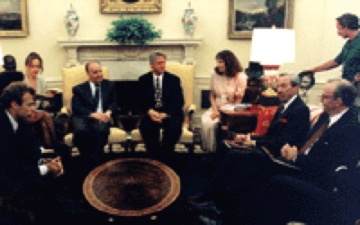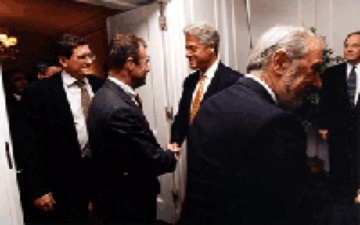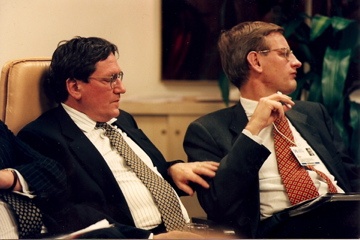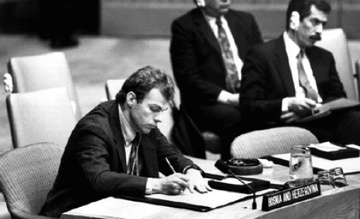



No Euro-Atlantic or for that matter international power had a commitment to Bosnia & Herzegovina’s survival. To the contrary, in 1992 most expected that BiH would disappear, as the country’s defense and government appeared badly outgunned on the military and diplomatic front. There had been no BiH diplomacy or defense forces until the eve of the war. BiH and its government though became an irritant simply by surviving and having not disappeared as many had anticipated and perceived as an effective solution to ending the conflict and curtailing the uncomfortable media images. What made Bosnia & Herzegovina an international reality is the country’s position as UN member state with theoretical rights and access to diplomatic apparatus, and even more critically, the courageous but also capable defenders of BiH who insured that country would not disappear so easily as many had predicted.
Expectation/Hope that Bosnia & Herzegovina Would Disappear:
If Bosnia & Herzegovina had disappeared, Washington would not have particularly missed its big embassy in Sarajevo today. The EU would not be disappointed not to have its representative within BiH’s borders. They undoubtedly felt that the territory, (remember, there would not have been anymore a sovereign country of BiH), and what was left of BiH’s people could be covered to the extent it would have any further international relevance from embassies in Belgrade, or for that matter Podgorica or even Zagreb, depending on who had then claimed and taken-over such lands. Bosnians & Herzegovinians would have missed BiH; many more probably would have been killed and/or ethnically expelled. From the big capitals there would have come expressions of sorrow, perhaps even condemnation directed at those perpetuating the ethnic cleansing, but it probably would not have carried the legal designation of genocide nor would there be a War Crimes Tribunal for the former Yugoslavia (ICTY) and probably no indictments and prosecutions anywhere else. Slobodan Milosevic still might be ruler in Belgrade, Seselj at his side and Arkan running the security forces.
Satisfying Milosevic First:
In 1995, as the Dayton process was to begin, EU negotiators and US viewed Milosevic as the regional authority that needed to be primarily satisfied. Franjo Tudjman was a factor, but he was seen as not so capable diplomatic force as was his military – and he was viewed as someone who in his search for approval from Washington and Europe, could be readily manipulated. Bosnia & Herzegovina’s future would be decided according to these US and EU negotiators, but in their talks in Belgrade with perhaps an obligatory stop in Zagreb to stroke Tudjman’s ego and insecurity.
Allowing Milosevic/Mladic to Create New Realities in Srebrenica, Zepa & Gorazde:
Dayton process did not start on November 1, 1995 in Dayton, Ohio, but in Belgrade in May of 1995. After Ratko Mladic’s forces had taken hostage UN personnel and chained them to potential air strike targets in order to deter any military intervention by NATO. The Belgrade and Pale representatives had the previous year, summer of 1994, rejected the so-called “final map” proposed by the Washington and the EU representatives, “Contact Group” for the internal delineation of BiH. They primarily coveted the “eastern UN/NATO safe areas” of Srebrenica, Zepa and Gorazde, which had been drawn into the Federation and had survived as part of the still free territory of BiH. Belgrade and Pale wanted such territory to be part of Republika Srpska so that it would have contiguous boundaries and could more readily be joined/integrated into Serbia/Montenegro at some time in the future.
The US, Europe (London and Paris primarily) and NATO were faced with a dilemma – find a quick resolution or withdraw the UNPROFOR “peacekeeping” presence from BiH as it had become actually a hostage to potential resolution. This was the position relayed to me by Joe Kruzel of the US Pentagon and negotiating team who would die tragically on Mount Igman less than a couple of months later that summer. Joe was a brilliant diplomat widely recognized for the necessary innovation of NATO’s Partnership for Peace and a relative of mine through marriage.
In June of 1995, Joe did not see a more robust position forthcoming against Milosevic, Mladic and Karadzic. Rather, there would be a build-up of a “rapid reaction force” whose purpose would be the possible extraction of UNPROFOR from BiH. In the alternative, some negotiated arrangement would effectively have to be shoved down the throat of the parties. General Rupert Smith had also conveyed to me a similar concern regarding UNPROFOR’s position in BiH. UNPROFOR had actually come to utilize BiH Government protected roads fearing/avoiding travel in Serbian controlled areas. (Ironically, it was this fear/exclusion from Serbian controlled areas that would cause Richard Holbrooke, General Wesley Clark, Joe Kruzel, Robert Frasure and Col. Sam Nelson Drew to have to come into Sarajevo over the dangerous roads on Mt. Igman – a road that we Bosnian officials and increasingly UNPROFOR had used extensively – but would prove the end for the 3 latter US diplomats).
Richard Holbrooke saw a collapse of negotiations as a personal loss, or more accurately, lost opportunity for further ambitions of negotiations. The possibility that UNPROFOR troops would withdraw and the arms embargo on BiH’s defense forces lifted also presented a degree of uncertainty for the Euro-Atlantic capitals and would be projected as a symbol of their impotence. They had just managed to start sweeping BiH from the front pages of global media.
Milosevic Made the Game & Holbrooke Liked to Play – Even if Less Clever than Slobo:
Robert Frasure went to Belgrade in May of 1995 to find out what Milosevic and Mladic wanted in order to agree to US sponsored negotiations starting to take shape in Holbrooke’s mind and ambitions. Holbrooke may have initially seen the Bosnians/Herzegovinians as victims and with sympathy. However, for Holbrooke, Milosevic was the key. And, on a personal level, Holbrooke liked playing the game with Milosevic – after all, Milosevic was the most prominent partner, seductive and a worthy challenge in Holbrooke’s mind. In effect, it was Milosevic who not only established the terms but the methodology of the negotiations – it was not about compromise and bargain but about bluff and poker.
“Instructed to Sacrifice Srebrenica, Gorazde and Zepa”:
The first play of the new round would be Milosevic’s demand for the eastern enclaves. I, as new BiH Foreign Minister, (and I believe the other diplomatic/political leaders of BiH), had been rejecting any “swaps” of territories for Srebrenica, Zepa and Gorazde. Having been rebuffed, Holbrooke and his mediation partners (most notably Carl Bildt, General Bernard Janvier and UN Chief in BiH Yasushi Akashi) decided to allow Milosevic and Mladic to create their own new realities on the ground that then would be shoved down the BiH leadership’s throat in concluding negotiations. Holbrooke himself has employed the word “instructed to sacrifice Srebrenica, Gorazde and Zepa.” The Dutch Defense Minister had told me already in early June that an assault was being prepared by fresh forces coming from Serbia – it is clear from subsequent statements that Defense Minister Joris Voorhoeve had received his information from CIA and other allied sources. See BBC program:
diplomaticallyincorrect.org/films/movie/ambassador-muhamed-sacirbey-on-betrayal-cover-up-regarding-srebrenica-genocide/17916).
I’m not certain of how far up from the chain of command this “instruction” came, from Washington or London or Paris, or if Holbrooke and others were acting on their own initiative within broad authority granted in the context of securing an end to war in BiH under any conditions. The deal or arrangement with Milosevic was also not a signed document, but the evidence of such an arrangement is compelling at least in terms of a yellow signal – removing the red light that had stood in form of not only UN mandated peacekeepers but also of NATO air strikes in the event Serbian forces attacked the “safe areas.” (As David Harland, then in UNPROFOR HQ in Zagreb and subsequently author of UN General Assembly mandated “Srebrenica Report,” in a series of joint interviews states there were at least 7 requests sent to UNPROFOR Command for air strikes to stop the Serbian advance upon Srebrenica and none were answered. – See Interviews at
diplomaticallyincorrect.org/films/movie/new-inquiry-on-srebrenica-genocide/19068 &
diplomaticallyincorrect.org/films/movie/fruits-of-genocide-srebrenica-to-prijedor/20091). (Subsequently, Zepa was abandoned by stated agreement of Contact Group and Holbrooke had tried to convince me to engage in a trade for Gorazde in August of 1995 after evidence of killings in Srebrenica started to come to light).
For All or Nothing & Still Same Stakes Today:
Don’t know if Holbrooke or President Alija Izetbegovic could see it, but Milosevic’s game was for all or nothing. It was not about compromise. Milosevic would concede only so much as was tactically necessary while maintaining the strategic objective of dismantling BiH.
President Izetbegovic was not easily intimidated. However, he was easily read by the other players around the table and thus became the subject of repeated bluffs. President Izetbegovic viewed negotiations as a give and take, where everyone asks for their maximum in the beginning and then the deal ends up somewhere in the middle. However, Milosevic held out for enough so that he would be in position to win it all by the end. Not certain that President Izetbegovic understood this manner of negotiations or poker, and on more than one occasion, he was put into position of making a compromise upon a compromise upon another compromise, until he had been taken to below the minimum where he would have at the start envisioned or agreed. Holbrooke may have understood the game better, but he really did not care about the final outcome – it was not something that would burden him. On more than one occasion, Holbrooke has referred to this as a poker game, and how he “dared not call Milosevic’s bluff” as he inevitably saw BiH as the weaker party and President Izetbegovic as the easier player to press. Milosevic’s bluff upon Holbrooke was then transformed into pressure and bluff by Holbrooke upon President Izetbegovic. (See References to the “Secret History of Dayton” -
diplomaticallyincorrect.org/films/blog_post/no-to-republika-srpska-yes-to-dayton-accords-not-consistent-by-ambassador-mo/21735).
The Dayton process was not about a just agreement or even one consistent with US and/or European core strategic interests. Neither Washington nor the EU representatives came to the process to support common democratic and free society values of the Euro-Atlantic family. Negotiations may have been fringed by cultural, historical and religious preconceptions: anti-Muslim bias and an over abundant respect for Belgrade. Personal ambitions of the “mediators” played as big motivation as any, and they were drawn into Milosevic game. It appealed to their egos and ambitions. It was not about a pre-conceived result as much as playing Milosevic’s game of seduction, bluff and poker.
This Article was written in cooperation between Al Jazeera Balkans and Diplomatically Incorrect. Bosnian language version is available at balkans.aljazeera.net/clanak/partija-pokera-i-trgovanje-bosnom-i-hercegovinom
By Ambassador Muhamed Sacirbey
www.diplomaticallyincorrect.org
“Srebrenica Genocide” Channel - diplomaticallyincorrect.org/c/the-genocide-of-srebrenica/most_recent/6







